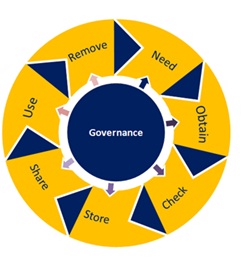Hi, I’m Lisa Allen; I am the lead for the data governance workstream of the #OpenDefra Data Programme. On 25 June the Secretary of State set out her vision for open data to transform food and farming. She gave a commitment to release substantial data holdings from across Defra and its arms length bodies by June 2016.
What is the data governance workstream?
I should start by saying that governance may give you the impression of lots of unnecessary processes. This is not what this workstream is about.
We’re looking at the data management processes we already have across Defra and identifying best practicee and where we can to simplify. In the short term we will identify where we can take a risk based approach to enable the release of 8,000 datasets as open data. In the long term we need to ensure a cultural change so we are mature open data publishers.
Getting the right people in the room
It’s been a busy few weeks identifying the right people from across Defra to come together and other organisations that can play a role like the Cabinet Office and Ordnance Survey and others. Sometimes the complexity of Defra is a challenge but it’s also an advantage as there is lots of experience and best practice to draw from. There are also lots of datasets which are candidates for open data as the remits of the organisations are wide ranging.
On 16 July 2015 we held a workshop with representatives from many of these organisations. For many, releasing open data was nothing new, but none of us have released open data on this scale before and in one year, which is an ambitious timeframe.
What we did
The first part of our workshop was to update everyone with the expectations and the benefits to everyone of releasing open data. Open data benefits those who want to use it. It will also be of benefit to us by sharing best practice and knowledge but it can also deliver our outcomes through others.
The second part of the workshop we used the data lifecycle to split into smaller groups and record what best practice we had. We also noted what our risks and issues are.
Data Lifecycle:

Challenges
Our challenges are numerous and include:
- Terminology we may call things by different names making it difficult to identify best practice.
- Resources and finance.
- Infrastructure some of our IT Systems are hard to get data out of.
- Cultural change to become open by default.
- Consistent data cataloguing and release.
- Legal rights and permissions.
None of these are insurmountable, but it is an ambitious target we are aiming for.
What next?
This workshop was the first step on our journey together. Our aim was to ensure everyone was up to speed, air their concerns and how we can help. We can now start breaking the work down into sizeable parts, playing to our strengths.
I’ve been told I’m an optimist, but I believe that you should never waste a good crisis. Releasing so many datasets in such a short period is a perfect opportunity to challenge how we have always done things and look at it from afresh. We can learn from others and build on the short term work to identify how we can take this back to enable long term cultural change to become open by default.
Lisa Allen is the National Data Integrity Manager at the Environment Agency and am currently on assignment to Defra for part of my time to lead the data governance workstream. At the Environment Agency she leads a successful team implementing data governance and data quality.
